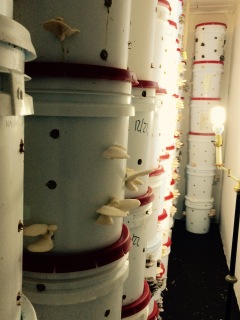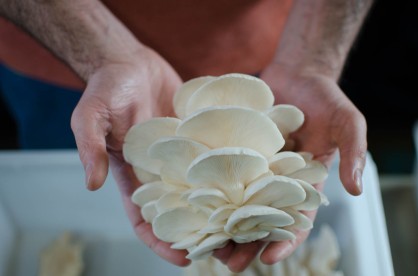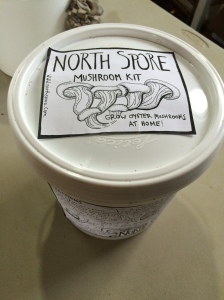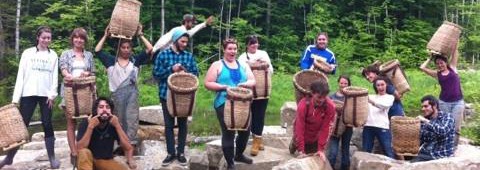LaDonna Redmond delivers an excellent Ted X Manhattan talk on food justice. I often get asked what the term “food justice” means when I identify it as my professional interest. LaDonna gives a short and well rounded explanation. Historical background gives the food justice movement a deeper narrative. Societal oppression via food takes form in food deserts and violence related to public health issues. The need for fair wages in the food industry ranges from exploited immigrants, to servers in restaurants, and farmers alike. Food is a cornerstone of humanity and we need to act out of respect for it and each other.
Month: January 2015
North Spore
 North Spore is small scale mushroom farm based in Westbrook, ME. It was created by three friends, Jon, Eliah, and Matt, after graduating from College of the Atlantic. They brought to life their love of mycology in the form of a business. They currently grow eight varieties of oyster mushrooms, create and sell mushroom kits, and have a mushroom CSA. For the future they are planning courses, offering more foraging walks, looking into selling nutrient rich compost, and working on experiments to cultivate new mushroom varieties.
North Spore is small scale mushroom farm based in Westbrook, ME. It was created by three friends, Jon, Eliah, and Matt, after graduating from College of the Atlantic. They brought to life their love of mycology in the form of a business. They currently grow eight varieties of oyster mushrooms, create and sell mushroom kits, and have a mushroom CSA. For the future they are planning courses, offering more foraging walks, looking into selling nutrient rich compost, and working on experiments to cultivate new mushroom varieties.
Jon gave me a tour of their impressive mushroom farm setup located in a warehouse. They maximize production in their small space through vertical growing techniques in almost every square foot. He explained the workings of mycology to me in brief and understandable terms.
Many issues of sustainability came up. A lesser known fact about the mushroom business is that it produces a lot of plastic waste. It is typical for producers to cultivate mushrooms in plastic bags that are thrown away after each round. North Spore has opted for reusable buckets in their production. This is a difficult point to bring up in their sales image however, given that most people are not even aware there is a problem to begin with.
 An obstacle many young farmers or start-ups face is viability of the business plan. North Spore is already receiving greater demand than they can accommodate. The are expanding with new space and hope to double or triple their mushroom supply. Another solution is forming a cooperative distribution system. This removes a part of the labor for them, while avoiding the cost of a middle man and simultaneously building a stronger, codependent community.
An obstacle many young farmers or start-ups face is viability of the business plan. North Spore is already receiving greater demand than they can accommodate. The are expanding with new space and hope to double or triple their mushroom supply. Another solution is forming a cooperative distribution system. This removes a part of the labor for them, while avoiding the cost of a middle man and simultaneously building a stronger, codependent community.
Jon believes that remaining local, not overextending their business, and constantly trying new techniques and observing their mushrooms to make sure they are operating in the most efficient manner are the keys to success. Stay up to date with opportunities to learn from and support North Spore on their website, or visit them on CSA pick up days at the Portland Food Co-op and pick up your own North Spore mushroom kit!
Cooperative Design Lab
Jonah Fertig and Rachel Lyn Rumson of Cooperative Fermentation are offering a Development Course for Cooperative Enterprise. The course will take place at the Wayfinder School in New Gloucester, Maine from January – March at a cost of $500-800 sliding scale per person or $1300 for a 3 person co-op.
Cooperatives build local economic resilience by providing their community goods and services and creating jobs through shared democratic business ownership. Cooperative Fermentation, a project of the Resilience Hub, is offering this course to strengthen the network of cooperatives in the region and to support the formation of co-ops in local farming and food production.
For full information about the course schedule and topics visit the Resilience Hub meet up page.
Local Living Classes!
The 2015 class schedule for Koviashuvik Local Living School is up!
Koviashuvik: an Inuit word for a time and place of joy in the present moment.
It is also the homestead and local living school of Chris and Ashirah Knapp. The couple and their two young children live a truly local lifestyle on their land in Temple, Maine. Living in the small house they built from their own woods, they grow a bulk of their own food. Garden bounty is stored in their root cellar to keep them nourished through the long winter months in Maine. Other goods procured during the summer and fall are preserved in the hand built dehydrator such as fruit leather, jerky, and herbs. And of course their will be a bounty of kraut, pickles, and acorn bread for all! In the spring, wild edibles are foraged using plant identification knowledge.
Almost all possessions are crafted by the family whether it be wooden kitchen spoons, ash pack baskets, or moccasins. Humanure composting completes the full circle of coexistence with the land.
Chris and Ashirah have been teaching in various formats for the past 16 years. Their mission is to share their skills and lifestyle to facilitate harmonious living with the earth and local community. The completion of the new classroom will create accommodation for larger classes on their land. Exciting times ahead!
Visit the website for information about classes and apprenticeships with Chris and Ashirah.
Product of Mexico
The LA Times did an investigative journalist piece, Product of Mexico, on labor farms in Mexico. They reported inhumane living conditions, unacceptably low food rations, and overall exploitation of the farmers. A large percentage of low cost produce in supermarkets is grown under these conditions. The article reported the U.S. is up to $7.6 billion in spending on imports from Mexico. With the workers getting paid an average of $8 to $12 a day, if they see their earnings at all, it is clear that the farmers are not the ones benefiting from this cross border trade.
American consumers are also not benefiting. When food travels from Mexico to your grocery store, the produce does not remain fresh. One strategy is for farmers to pick produce when it is considerably underripe, so that it arrives at the grocery store not spoiled, and can maintain a shelf life. When vegetables do not have the chance to become ripe on the vine, a large percentage of the nutrients is sacrificed. The vine that was transporting essential elements from the earth to the vegetable was cut too early. A comparable occurrence in nature would be to cut the connection of the umbilical cord of a baby to its mother too early – it would miss out on essential nutrients to be healthy.
Pesticides and chemicals become a necessity to maintain produce on the long journey to the grocery store as well. In turn, this becomes a regular part of the American dinner plate. These chemicals also become a part of the ecosystem, seeping into the land and running off into water sources. The packaging involved clogs landfills. The transportation it requires to move food globally, known as food miles, is a large contributor to carbon emissions.
However, the inconvenient truth is that inexpensive, imported product is all many Americans can afford, or even have access to. This creates a humanitarian crisis on both ends of the food chain. Exploited workers are essentially enslaved by big agriculture, which is controlled by big business such as Wal-Mart, which provides produce to the low-income sector of the country.
This is a brief, but poignant argument for local food education. What you eat has a lot more impact than just on your health and weight. It is a humanitarian and environmental issue. Our consumer dollar supports much larger systems that are not transparent to the typical consumer. Buying locally increases your ability to ensure you are supporting positive employment practices, supports local economy, and increases the freshness and nutritional value of your produce.
If you have the means, support your local farmer. Advocate for community gardens, urban agriculture, and community education around sustainable food.
Film: Growing Local
The screening will take place at Space Gallery on January 21 at 7:00pm.
While “buying local” is on the rise, the stories in GROWING LOCAL make clear that small farms and access to locally produced food is not a sure thing. In three short vignettes we meet the young farm couple Ben & Taryn, who, on risky sweat-equity, have revitalized a famously fertile piece of farmland into a thriving community food hub, artisanal butcher Ben who helps us better understand how healthier, thoughtful meat production can be supported and sustained, and Richard and Adam, father and son organic dairy farmers struggling to keep their family farm going and in the family. These poignant stories help us understand the interconnected fates of Maine’s small farms, consumers and the local food movement.
The film will be co-presented by Maine Farmland Trust and The Portland Food Co-op, and will be followed by a Q+A with the director and others involved in the film.



